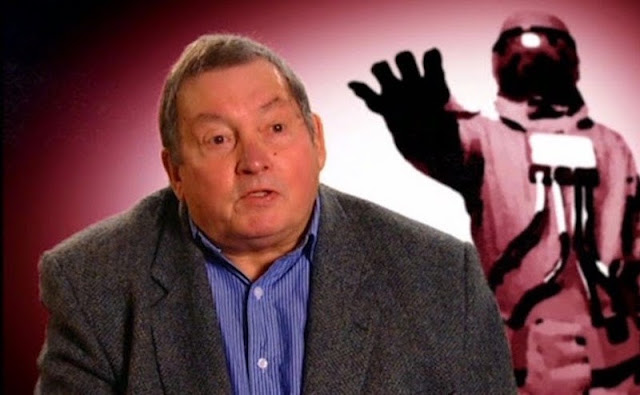Terrance Dicks was the
last of the big beasts of classic Doctor
Who and his place in the pantheon of its writers is legendary. Not only did
he oversee one of the most popular periods of the programme’s history but he
also penned many Target novels which kept us close to the series when it wasn’t
on. Later on his genial yet open responses in countless interviews earned him
the kindly sobriquet `Uncle Terrance` though he had claws when he wanted to
notably his reaction to the 1996 TV Movie or calling John Nathan-Turner “not
fit for purpose” or in reference to 70s campaigner Mary Whitehouse- “If there’s
one thing she hated more than sex, its Doctor Who”. More than anything- in
fiction and in life- he told it how it was.
“Monsters are always
green” he once said and it is this certainty of purpose that drove his work on
the series. He and Barry Letts’ version of what one writer once dubbed
`Pertweeland` ushered in a version of Doctor
Who a wide audience could relate to. Already there in template form, they rounded
the sharp edges (just as they softened the UNIT look), adding archetypal
characters – the scatty companion, the devilish villain- and yet made them
interesting. He was certainly an ideas man too- co-creating the Time Lords, having
the idea that became the Silurians and most famously he thought of the Master. Yes
it seems an obvious thing now but it captivated a generation.
The Doctor moulded in this
era has been called pompous, upper class even but I always think it was
Terrance Dicks who ensured he wasn’t really that at all. More than anything that
pomposity arose from irritation at the short sightedness of humanity- a theme
both he and Barry Letts pushed. One aspect of the period that works exceptionally
well is the mutual respect- occasionally grudging but always present- between
the Doctor and the Brigadier. It’s unspoken and helped by both actors but its
presence shows a maturity that isn’t always associated with the era or indeed
its creators.
Alongside a brigade of
writers unmatched in the series’ lengthy history, they made Doctor Who an accessible success
stretching the largely earthbound format to its limit. Crucially Terrance knew
how to drive plots from start to end. And always, always good versus evil with
good triumphing by means of stealth and intelligence rather than force.
It may sound simplistic to
the modern palette but this is an era of Doctor
Who to which fans return and reassess again and again. Attempts to rubbish
it have never lasted long because it is impressive in it’s directness and a lot
of that is because of Terrance Dicks. Yet he was more than just a meat and
potatoes writer, some of his dialogue is amongst the programme’s best. Lines
like “There’s no point in being a grown up if you can’t be childish” from
`Robot` for example. In fact that story is Terrance Dicks showing how to
introduce a new Doctor with the minimum of fuss but the maximum of wonder. He
seemed to have a knack of writing for the fourth Doctor actually, despite being
mostly associated with the Third, as his work in `Horror of Fang Rock`
demonstrates. And he gives latter day Tom Baker a wonderful line in `State of
Decay` ; “Oh knowing’s easy. Everyone does that ad nauseum. I just hope.” The recently
introduced quote that the Doctor is “never cowardly or cruel” came from something
Terrance Dicks used to say a long time back as well.
Yet arguably an even
bigger contribution to Doctor Who
lore is Terrance Dicks’ formidable range of Target book adaptations to many of
which he added extra glimpses never shown on television. The books introduced a
wonderful shorthand that has made its way into the fan lexicon including his pin
sharp descriptions of each Doctor – “crotchety old man”, “a mop of curly hair”,
“a pleasant, open face” - and his depiction of the Tardis’ “wheezing, groaning
sound.” He also co wrote the brilliant 1972 `Making of Doctor Who` which was an
invaluable text at the time of very little information about the series.
I read quite a lot as a
child but it was Terrance Dicks that made me want to write even if it eventually took decades for me to do so. All the way through working on my first novel
I had this voice on my shoulder that, when confronted with a knotty plot cul-de-sac
would ask - “What would Terrance do?” There are some quite famous children’s
authors who would benefit from that mantra. Today I’ve read a lot of people
saying how Terrance Dicks’ Target books- and other kids books he wrote (about
145 between 1976- 2003!!) - helped them to enjoy reading and combined with his
work on Doctor Who that is a wonderful
legacy to leave behind.


No comments:
Post a Comment
Note: only a member of this blog may post a comment.